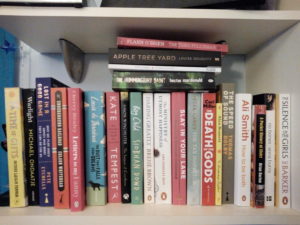 A cursory search of Uborka suggests that I don’t keep you very updated on my reading material anymore; the last decent set of book reviews was some holiday reading from 2014. On tweeting my To-Read Shelf [left], Uborkite Graybo asked if I would be reviewing them all. Not bloody likely, I replied. Then I relented and offered a top five of 2019, and here it is.
A cursory search of Uborka suggests that I don’t keep you very updated on my reading material anymore; the last decent set of book reviews was some holiday reading from 2014. On tweeting my To-Read Shelf [left], Uborkite Graybo asked if I would be reviewing them all. Not bloody likely, I replied. Then I relented and offered a top five of 2019, and here it is.
- The Heart’s Invisible Furies, by John Boyne
If you have not read this book, then you must. This epic novel circles around the story of Cyril, an adopted child growing up in Dublin, from his birth in 1945 until the present day. Cyril is different, and as soon as he figures out where he fits into the world, the world changes, sometimes with a bang. The twists may seem unlikely, but you want them to happen all the same. This was my introduction to John Boyne, and there is something about his prose that made me fall in love with the book from the opening paragraphs. I tried to read Eoin McNamee’s The Vogue after this and simply couldn’t get along with its sparse staccato style after Boyne’s poetic writing (but did enjoy The Vogue when I came back to it a few months later). Pete’s dad sometimes borrows books from me, and I was in two minds about giving him this, but he told me he managed to enjoy it despite its subject matter, so there you go: high praise. - The Seven Deaths of Evelyn Hardcastle, by Stuart Turton
Like The Heart’s Invisible Furies, I passed this book to Pete and insisted he read it immediately so that we could discuss it (it’s handy having your own in-house book club). This one took some figuring out; at first I thought I was missing something, then I realised that I was supposed to feel like that. I don’t think Pete found it as astounding as I did, but his dad did, and as we know, that’s quite the accolade. I’m pretty sure I never quite got the story straight; it’s the most twisted tail I have ever read. Good luck with it. - The Children of Jocasta, by Natalie Haynes
I really like Natalie Haynes. I try to catch her every year at The Also Festival; she is one of the most intelligent speakers I have ever had the utter delight of listening to, and she makes me cry with laughter. When I read her first book, The Amber Fury, I was utterly disappointed by it. The Children Of Jocasta more than compensates for it; she has found her groove and I’m so in it with her. In keeping with Haynes’ well-established approach of showing us the hidden women of the classics, this is the retelling of the story of Oedipus from the perspective of his mother. Her story-telling is sharp as glass, and these women who are usually relegated to the shadows are full and real human beings with agency and with feelings. I’ve a whole stack of classics retold by female authors, and this was an excellent start. - The Memory-Keeper’s Daughter, by Kim Edwards
In 1964, Dr Henry’s wife gives birth to twins. One has Down’s Syndrome, and while his wife is still under the influence of ‘twilight sleep,’ he chooses to dispose of the child and tell her that it died. I felt such anger and grief as I read this, while still entertained by it as a well-told story. In the summer my mum and I were going through some old family paperwork and found a letter written by a family doctor, imploring my grandparents not to institutionalise their son, who also had Down’s. They had their own complex reasons for the decisions they made, and at least in this case perhaps nobody was gaslighted about it, as was the wife of Dr Henry. This is a raw first novel, no great work of literature, but impossible to read without being moved by it. - Hag-Seed, by Margaret Atwood
Margaret Atwood retells The Tempest, and does Shakespeare proud. It’s witty, vengeful, and modern. He would have loved it. There’s a play within a play within a play; a tight cast; and a storm to end all storms. It will do until I get my hands on a copy of The Testaments. - This is going to hurt, by Adam Kay
This is the honourable mention, a book I thought I was going to hate because of Kay’s mysoginistic attitude to birthing women, which is undeniably front and centre at this autobiography of the former-obstetrician, turned-comedian. And yet somehow Kay managed to evoke the life of a junior doctor in a way that delivers nothing but empathy and gratitude for everyone working within the NHS.Maybe if I can be bothered, I’ll go and have a look at the rest of the decade for you later. This should keep you going for now, though.

Time to visit my local independent bookshop….